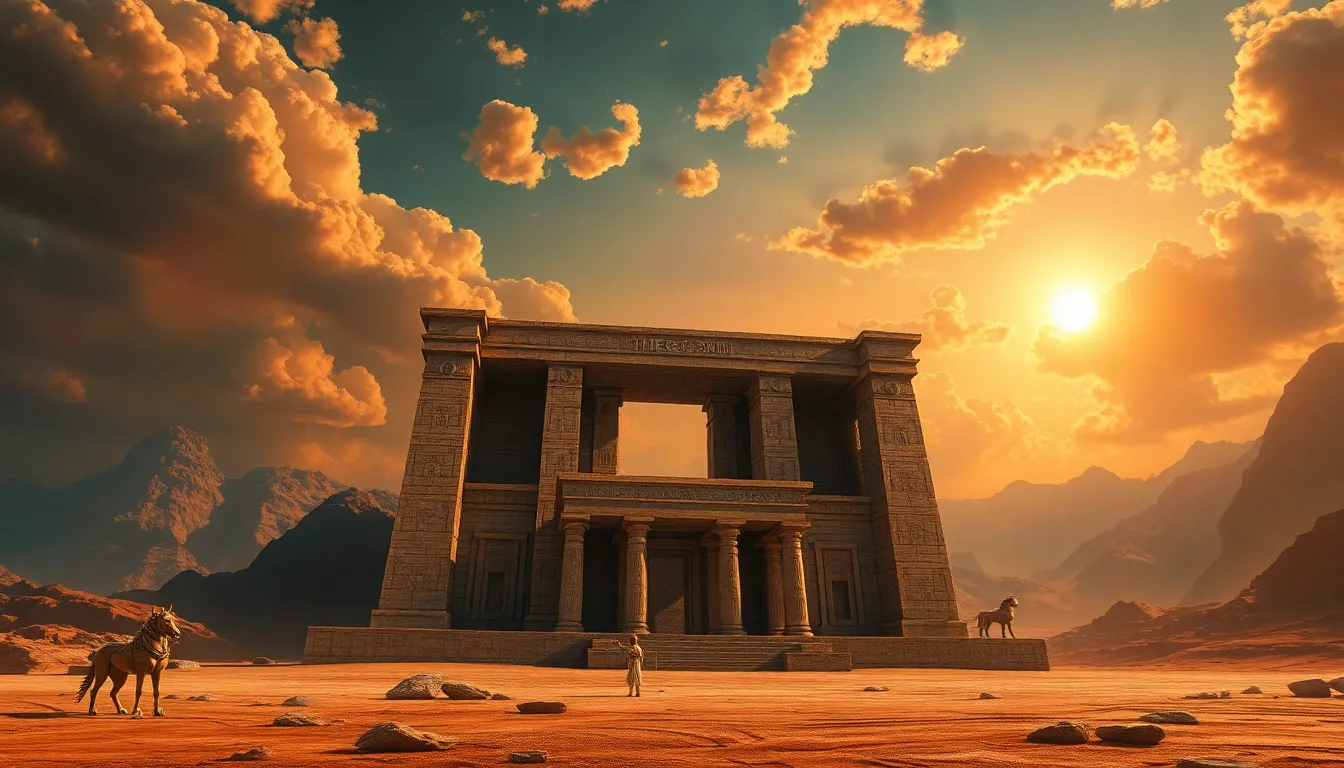The Temple of Set: The Balance of Chaos
I. Introduction
The Temple of Set is a modern religious organization founded in the 1970s that draws inspiration from ancient Egyptian mythology, particularly the figure of Set, the god of chaos, storms, and the desert. This temple serves as a hub for individuals seeking to explore their own personal power and embrace the chaos inherent in existence. In Setian philosophy, chaos is not merely disorder; it is a vital force that facilitates transformation and personal growth.
This article aims to provide an in-depth exploration of the Temple of Set, examining its historical background, philosophical tenets, ritual practices, and the significance of chaos in relation to personal empowerment and spirituality.
II. Historical Background of the Temple of Set
The Temple of Set was officially founded by Michael A. Aquino in 1975, emerging from the Church of Satan. Aquino sought to create a religious organization that focused on the worship of Set as a deity representing individualism and personal empowerment. The Temple quickly attracted members who resonated with its ideals of self-deification and the exploration of one’s own potential.
Key figures in the establishment of the Temple include:
- Michael A. Aquino – the founder and high priest, who articulated the philosophy of Set.
- Don Webb – a prominent member and writer who contributed to the Temple’s body of literature.
- Other early members who helped shape the organization’s rituals and doctrines.
The influence of ancient Egyptian mythology is evident in the Temple’s practices and beliefs, as Set is revered as a complex deity who embodies both creation and destruction, order and chaos. This duality is central to the Temple’s teachings and rituals.
III. The Philosophy of Set
Set is understood in Setian philosophy as a deity representing chaos, but this chaos is not viewed negatively. Instead, it is seen as a source of creativity and transformation. In the context of Setian thought, chaos and order are not opposing forces but rather two sides of the same coin, each necessary for the other’s existence.
This philosophy stands in contrast to traditional religious beliefs that often emphasize strict moral codes and order. Setians embrace the fluidity of existence and recognize that chaos can lead to personal empowerment and enlightenment.
IV. Ritual Practices within the Temple of Set
The Temple of Set engages in a variety of rituals and ceremonies designed to facilitate personal development and exploration of the self. These rituals often include:
- Rituals of self-initiation – allowing members to define their own spiritual paths.
- Magical workings – using personal will and intention to manifest desired outcomes.
- Celebrations of Setian holidays – honoring important events and aspects of Setian philosophy.
At the core of these practices is the emphasis on individualism and self-deification. Setians are encouraged to cultivate their own unique identities and to pursue their own definitions of success and fulfillment.
V. Theological Concepts of Chaos and Balance
In Setian philosophy, chaos is defined as the natural state of the universe, characterized by unpredictability and change. This contrasts with the rigid structures often imposed by societal norms and traditional religions. The Temple teaches that embracing chaos can lead to a deeper understanding of oneself and one’s place in the world.
Balance is a crucial concept within this framework. Setians strive to find harmony between chaos and order in their lives, recognizing that:
- Too much chaos can lead to instability.
- Too much order can stifle creativity and growth.
Rituals often incorporate elements that allow practitioners to experience and embrace chaos while also cultivating a sense of balance, such as meditation, visualization, and symbolic acts that represent the interplay between chaos and order.
VI. The Temple of Set in Contemporary Society
The Temple of Set has had a significant influence on modern occult practices and organizations. Its teachings have inspired various paths that emphasize individualism, personal empowerment, and the exploration of one’s own spirituality. Setian beliefs have also contributed to broader discussions about the nature of spirituality in contemporary society.
However, misconceptions and stereotypes surround Setian beliefs, often portraying them as malevolent or anti-social. These misunderstandings arise from a lack of knowledge about the Temple’s actual teachings and practices. Setians often find themselves defending their beliefs against external criticisms, emphasizing their commitment to personal growth and self-exploration.
VII. Critiques and Controversies
As with any religious organization, the Temple of Set has faced internal debates and external criticisms. Internally, members may disagree on interpretations of rituals, the role of leadership, and the application of Setian philosophy in modern life.
Externally, critics from both religious and secular communities may challenge the Temple’s emphasis on chaos and individualism, viewing it as a threat to societal norms. In response, Setian adherents often defend their beliefs by highlighting the importance of personal empowerment, responsibility, and the positive aspects of embracing chaos in a structured manner.
VIII. Conclusion
In summary, the Temple of Set represents a unique exploration of the balance of chaos in spiritual practice. Through its focus on individualism, self-deification, and the embrace of chaos, it offers a compelling alternative to traditional religious frameworks. The teachings of the Temple are particularly relevant in today’s world, where many seek personal empowerment and a deeper understanding of their own identities.
Ultimately, the Temple of Set encourages individuals to recognize the power inherent in chaos and to use it as a catalyst for personal growth and transformation. As modern spiritual landscapes continue to evolve, the insights offered by Setian philosophy may resonate with those looking for a path of self-discovery and empowerment.




